Articles
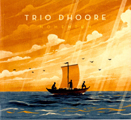 [by Ken Hunt, London] One of the most life-changing discoveries of my life was being handed a linguistic skeleton key in the spring of 1971. Turning 20 working in the print on the German-Danish border, every day it was Hochdeutsch to management and Plattdütsch or Low German to nearly everybody else. Plattdütsch is a working-class language that straddles the Schleswig-Holstein boundary between Germany and Denmark.
[by Ken Hunt, London] One of the most life-changing discoveries of my life was being handed a linguistic skeleton key in the spring of 1971. Turning 20 working in the print on the German-Danish border, every day it was Hochdeutsch to management and Plattdütsch or Low German to nearly everybody else. Plattdütsch is a working-class language that straddles the Schleswig-Holstein boundary between Germany and Denmark.
13. 12. 2016 |
read more...
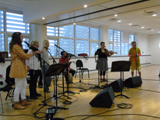 [by Ken Hunt, London] The Sage is the hub of so much arts-related activity on Tyneside and the north-east England region. It was meet and right for the venue to host this much anticipated project. Its promotional literature described Eliza Carthy bringing together second-generation folk artists, like herself, from across Europe. Her accomplices were the genre-stretching Czech vocalist-violinist Iva Bittová, the Greek singer and lute player Martha Mavroidi,
[by Ken Hunt, London] The Sage is the hub of so much arts-related activity on Tyneside and the north-east England region. It was meet and right for the venue to host this much anticipated project. Its promotional literature described Eliza Carthy bringing together second-generation folk artists, like herself, from across Europe. Her accomplices were the genre-stretching Czech vocalist-violinist Iva Bittová, the Greek singer and lute player Martha Mavroidi,
9. 11. 2016 |
read more...
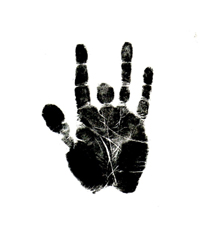 [by Ken Hunt, London] In April 1981 I walked into the anteroom of hotel round the corner from Green Park tube station in Central London to do the first of a series of booked interviews with members of the Grateful Dead. A hirsute gentleman, actually an aureole of hair with a splash of face, eyed me up and crossed the room to talk to me.
[by Ken Hunt, London] In April 1981 I walked into the anteroom of hotel round the corner from Green Park tube station in Central London to do the first of a series of booked interviews with members of the Grateful Dead. A hirsute gentleman, actually an aureole of hair with a splash of face, eyed me up and crossed the room to talk to me.
9. 8. 2016 |
read more...
 [by Ken Hunt, London] Britain’s folk clubs must seem strange to anyone visiting them for the first time. They are an exceedingly British institution, only found on English, Northern Irish, Scottish and Welsh soil – or, allowing for poetic licence, on foreign soils as British forces’ transplants, such as RAF Luqa’s Malta Folk Club and the British Army on the Rhine. To interject a personal observation, the folk club equivalents in Eire, Germany, the Netherlands, Germany and the USA all have altogether different characters.
[by Ken Hunt, London] Britain’s folk clubs must seem strange to anyone visiting them for the first time. They are an exceedingly British institution, only found on English, Northern Irish, Scottish and Welsh soil – or, allowing for poetic licence, on foreign soils as British forces’ transplants, such as RAF Luqa’s Malta Folk Club and the British Army on the Rhine. To interject a personal observation, the folk club equivalents in Eire, Germany, the Netherlands, Germany and the USA all have altogether different characters.
19. 2. 2016 |
read more...
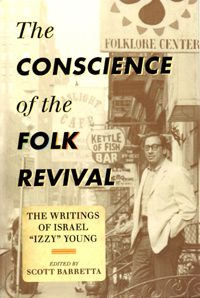 [by Ken Hunt, London] This fascinating gathering of writings from Israel G. Young appeared in 2013. The elder of two sons born to Polish Jewish parents in March 1928 on Manhattan’s Lower East Side, he reveals himself as a clear-sighted and sometimes curmudgeonly commentator, catalyst and chronicler of the New York folk scene. (California and Europe barely get walk-on parts.)
[by Ken Hunt, London] This fascinating gathering of writings from Israel G. Young appeared in 2013. The elder of two sons born to Polish Jewish parents in March 1928 on Manhattan’s Lower East Side, he reveals himself as a clear-sighted and sometimes curmudgeonly commentator, catalyst and chronicler of the New York folk scene. (California and Europe barely get walk-on parts.)
6. 1. 2016 |
read more...
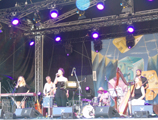 [by Ken Hunt, London] As years go, 2015 was one that over and over again plucked some remarkable rabbits out the magician’s hat. That’s what keeps me keeping on. A note on the process when it comes to these decisions. Part of it is to do with whittling.
[by Ken Hunt, London] As years go, 2015 was one that over and over again plucked some remarkable rabbits out the magician’s hat. That’s what keeps me keeping on. A note on the process when it comes to these decisions. Part of it is to do with whittling.
31. 12. 2015 |
read more...
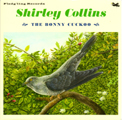 [by Ken Hunt, London] This month’s collection is a mixture of project-related listening and music listened to just for pleasure. In the latter case that doesn’t happen too often. On 5 July 2015 Shirley Collins celebrated her 80th birthday in London as All in the Downs but I was working in Germany on that date.
[by Ken Hunt, London] This month’s collection is a mixture of project-related listening and music listened to just for pleasure. In the latter case that doesn’t happen too often. On 5 July 2015 Shirley Collins celebrated her 80th birthday in London as All in the Downs but I was working in Germany on that date.
15. 12. 2015 |
read more...
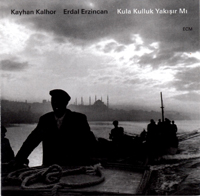 [by Ken Hunt, London] “How unseemly it is to follow anyone slavishly,” was ECM’s press release’s free (one suspects) translation for the title track in 2013. Performing Muhlis Akarsu’s Kula Kulluk Yakýîir Mý therefore could be perceived as a pointed choice since he died in a firebombing in 1993 aged 45 or so.
[by Ken Hunt, London] “How unseemly it is to follow anyone slavishly,” was ECM’s press release’s free (one suspects) translation for the title track in 2013. Performing Muhlis Akarsu’s Kula Kulluk Yakýîir Mý therefore could be perceived as a pointed choice since he died in a firebombing in 1993 aged 45 or so.
30. 11. 2015 |
read more...
 [by Ken Hunt, London] In 1955 North America’s modern-era fascination with Hindustani music began with the advent of jet travel and the arrival of the sarod maestro Ali Akbar Khan in New York. By then, Shamin Ahmed Khan, born in Baroda, Baroda State (modern-day Gujarat) on 10 September 1938, had already met the musician who would transform his life.
[by Ken Hunt, London] In 1955 North America’s modern-era fascination with Hindustani music began with the advent of jet travel and the arrival of the sarod maestro Ali Akbar Khan in New York. By then, Shamin Ahmed Khan, born in Baroda, Baroda State (modern-day Gujarat) on 10 September 1938, had already met the musician who would transform his life.
31. 10. 2015 |
read more...
 [by Ken Hunt, London] One day before her third album Coracle‘s official release the Emily Portman Trio performed much of it a good number of songs at a Sunday lunchtime concert at the Riverhouse Arts Centre in Walton-on-Thames. A splendid, characterful venue yards away from the Thames, its barn-like interior is all wooden beams and half-timbered decorations. It made for a stark backdrop for the Trio.
[by Ken Hunt, London] One day before her third album Coracle‘s official release the Emily Portman Trio performed much of it a good number of songs at a Sunday lunchtime concert at the Riverhouse Arts Centre in Walton-on-Thames. A splendid, characterful venue yards away from the Thames, its barn-like interior is all wooden beams and half-timbered decorations. It made for a stark backdrop for the Trio.
19. 8. 2015 |
read more...
« Later articles
Older articles »
 [by Ken Hunt, London] One of the most life-changing discoveries of my life was being handed a linguistic skeleton key in the spring of 1971. Turning 20 working in the print on the German-Danish border, every day it was Hochdeutsch to management and Plattdütsch or Low German to nearly everybody else. Plattdütsch is a working-class language that straddles the Schleswig-Holstein boundary between Germany and Denmark.
[by Ken Hunt, London] One of the most life-changing discoveries of my life was being handed a linguistic skeleton key in the spring of 1971. Turning 20 working in the print on the German-Danish border, every day it was Hochdeutsch to management and Plattdütsch or Low German to nearly everybody else. Plattdütsch is a working-class language that straddles the Schleswig-Holstein boundary between Germany and Denmark.  [by Ken Hunt, London] The Sage is the hub of so much arts-related activity on Tyneside and the north-east England region. It was meet and right for the venue to host this much anticipated project. Its promotional literature described Eliza Carthy bringing together second-generation folk artists, like herself, from across Europe. Her accomplices were the genre-stretching Czech vocalist-violinist Iva Bittová, the Greek singer and lute player Martha Mavroidi,
[by Ken Hunt, London] The Sage is the hub of so much arts-related activity on Tyneside and the north-east England region. It was meet and right for the venue to host this much anticipated project. Its promotional literature described Eliza Carthy bringing together second-generation folk artists, like herself, from across Europe. Her accomplices were the genre-stretching Czech vocalist-violinist Iva Bittová, the Greek singer and lute player Martha Mavroidi, [by Ken Hunt, London] In April 1981 I walked into the anteroom of hotel round the corner from Green Park tube station in Central London to do the first of a series of booked interviews with members of the Grateful Dead. A hirsute gentleman, actually an aureole of hair with a splash of face, eyed me up and crossed the room to talk to me.
[by Ken Hunt, London] In April 1981 I walked into the anteroom of hotel round the corner from Green Park tube station in Central London to do the first of a series of booked interviews with members of the Grateful Dead. A hirsute gentleman, actually an aureole of hair with a splash of face, eyed me up and crossed the room to talk to me.  [by Ken Hunt, London] Britain’s folk clubs must seem strange to anyone visiting them for the first time. They are an exceedingly British institution, only found on English, Northern Irish, Scottish and Welsh soil – or, allowing for poetic licence, on foreign soils as British forces’ transplants, such as RAF Luqa’s Malta Folk Club and the British Army on the Rhine. To interject a personal observation, the folk club equivalents in Eire, Germany, the Netherlands, Germany and the USA all have altogether different characters.
[by Ken Hunt, London] Britain’s folk clubs must seem strange to anyone visiting them for the first time. They are an exceedingly British institution, only found on English, Northern Irish, Scottish and Welsh soil – or, allowing for poetic licence, on foreign soils as British forces’ transplants, such as RAF Luqa’s Malta Folk Club and the British Army on the Rhine. To interject a personal observation, the folk club equivalents in Eire, Germany, the Netherlands, Germany and the USA all have altogether different characters. [by Ken Hunt, London] This fascinating gathering of writings from Israel G. Young appeared in 2013. The elder of two sons born to Polish Jewish parents in March 1928 on Manhattan’s Lower East Side, he reveals himself as a clear-sighted and sometimes curmudgeonly commentator, catalyst and chronicler of the New York folk scene. (California and Europe barely get walk-on parts.)
[by Ken Hunt, London] This fascinating gathering of writings from Israel G. Young appeared in 2013. The elder of two sons born to Polish Jewish parents in March 1928 on Manhattan’s Lower East Side, he reveals himself as a clear-sighted and sometimes curmudgeonly commentator, catalyst and chronicler of the New York folk scene. (California and Europe barely get walk-on parts.) [by Ken Hunt, London] As years go, 2015 was one that over and over again plucked some remarkable rabbits out the magician’s hat. That’s what keeps me keeping on. A note on the process when it comes to these decisions. Part of it is to do with whittling.
[by Ken Hunt, London] As years go, 2015 was one that over and over again plucked some remarkable rabbits out the magician’s hat. That’s what keeps me keeping on. A note on the process when it comes to these decisions. Part of it is to do with whittling.  [by Ken Hunt, London] This month’s collection is a mixture of project-related listening and music listened to just for pleasure. In the latter case that doesn’t happen too often. On 5 July 2015 Shirley Collins celebrated her 80th birthday in London as All in the Downs but I was working in Germany on that date.
[by Ken Hunt, London] This month’s collection is a mixture of project-related listening and music listened to just for pleasure. In the latter case that doesn’t happen too often. On 5 July 2015 Shirley Collins celebrated her 80th birthday in London as All in the Downs but I was working in Germany on that date.  [by Ken Hunt, London] “How unseemly it is to follow anyone slavishly,” was ECM’s press release’s free (one suspects) translation for the title track in 2013. Performing Muhlis Akarsu’s Kula Kulluk Yakýîir Mý therefore could be perceived as a pointed choice since he died in a firebombing in 1993 aged 45 or so.
[by Ken Hunt, London] “How unseemly it is to follow anyone slavishly,” was ECM’s press release’s free (one suspects) translation for the title track in 2013. Performing Muhlis Akarsu’s Kula Kulluk Yakýîir Mý therefore could be perceived as a pointed choice since he died in a firebombing in 1993 aged 45 or so.  [by Ken Hunt, London] In 1955 North America’s modern-era fascination with Hindustani music began with the advent of jet travel and the arrival of the sarod maestro Ali Akbar Khan in New York. By then, Shamin Ahmed Khan, born in Baroda, Baroda State (modern-day Gujarat) on 10 September 1938, had already met the musician who would transform his life.
[by Ken Hunt, London] In 1955 North America’s modern-era fascination with Hindustani music began with the advent of jet travel and the arrival of the sarod maestro Ali Akbar Khan in New York. By then, Shamin Ahmed Khan, born in Baroda, Baroda State (modern-day Gujarat) on 10 September 1938, had already met the musician who would transform his life. [by Ken Hunt, London] One day before her third album Coracle‘s official release the Emily Portman Trio performed much of it a good number of songs at a Sunday lunchtime concert at the Riverhouse Arts Centre in Walton-on-Thames. A splendid, characterful venue yards away from the Thames, its barn-like interior is all wooden beams and half-timbered decorations. It made for a stark backdrop for the Trio.
[by Ken Hunt, London] One day before her third album Coracle‘s official release the Emily Portman Trio performed much of it a good number of songs at a Sunday lunchtime concert at the Riverhouse Arts Centre in Walton-on-Thames. A splendid, characterful venue yards away from the Thames, its barn-like interior is all wooden beams and half-timbered decorations. It made for a stark backdrop for the Trio.